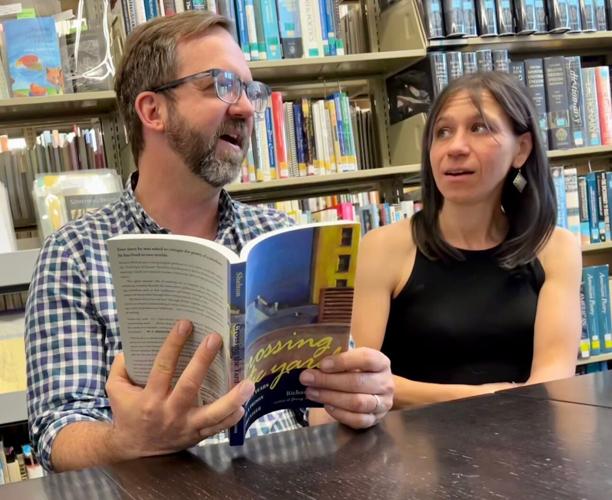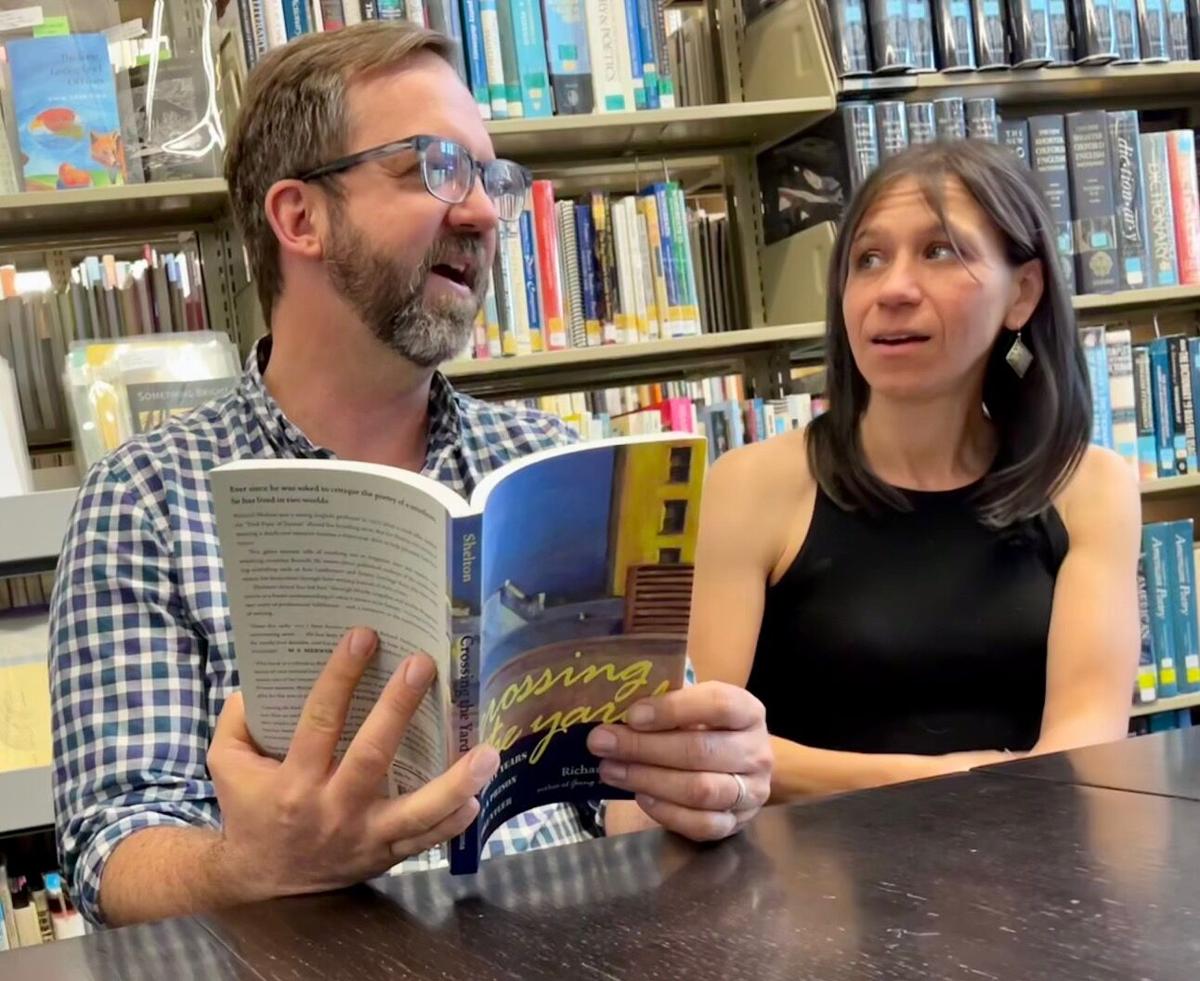Robert Frost never told us where it was, exactly, but the poet’s road less traveled apparently runs through Michigan.
It was there, after all, that Becca Fealk — the daughter of a lawyer, the stepdaughter of a cop — began a lifetime of service helping men and women behind bars.
She has worked in shelters, group homes and re-entry centers. She has helped former inmates get jobs, medical help and day care for their kids.
And when that less-traveled road brought Fealk to Tucson, she quickly connected with Read Between the Bars, a group of local volunteers who collect books on behalf of inmates being held at the 19 state and federal prisons in Arizona.
RBtL is not new — it was founded in 2007 — but its workload has ebbed and flowed over the years, depending on the regulatory mood of the Arizona Department of Corrections.
From 2017-23, for example, department policies prohibited anyone other than publishers and retailers from sending printed material into state facilities.
Late last year, those policies were changed, and Read Between the Bars went back to work.
Since January, the group has fielded requests from 309 inmates and delivered 860 books across the state.
“Things have really picked up,” Fealk said. “Word travels fast in the carceral world, and every time a package of our books arrives at an Arizona prison, more and more people notice. It’s great to start hearing from them again.”
This breakthrough is particularly rewarding to Fealk, who has spent half her life working with families touched by the criminal justice system.
The journey began during her freshman year at Kalamazoo College, 125 miles from her childhood home near Detroit.
“In my first year I took a sociology class that explored the issues surrounding prisons,” she said. “As part of that class, we did an inside-out research project, talking to people inside and then some people in a re-entry center. When I saw the world through their eyes, it opened mine. I wanted to help them.”
And so she has, for the last 18 years.
AmeriCorps took her to a homeless shelter in Alamosa, Colorado, and the Yavapai Re-entry Project in Prescott.
After receiving a master’s degree in public administration from the University of Arizona, Fealk worked with the American Friends Service Committee and Just Communities Arizona, helping families touched by criminal justice.
“As a culture, we are really good at ‘othering’ people, at ostracizing people,” Fealk said. “A lot of us like to draw a line between ‘us’ and ‘them.’ Well, people who have been touched by the justice system are us. They were part of our community before, and they’ll be part of our community when they come back. We should be there for them. They need us.”
Read Between the Bars, she said, helps keep detainees connected to the world outside the walls.
It is telling, she notes, that book requests from inmates mirror the preferences of those same age groups in the general community.
Younger inmates lean toward science fiction, fantasy and horror, just as they do at local libraries. Older prisoners are more likely to request art books, craft books, self-help books and mysteries.
“It’s really exciting when someone asks for a classic,” Fealk said. “The other day somebody requested ‘Lord of the Flies,’ and I thought ‘Oh my gosh, we have that!’”
Read Between the Bars could be the poster child for grass-roots philanthropy in Southern Arizona. There are no paid staff members. The organization’s “library” is a guest house behind a volunteer’s midtown home. When books are ready to be mailed, they are wrapped in brown paper grocery bags collected by friends and RBtB volunteers.
As for the organization’s budget?
“Ninety-nine percent of the cash donations we receive go to postage,” Fealk said. “The other 1% is used to buy tape. Two lines. That’s it.”
The group meets twice a month to open requests, select books and package them for mailing.
There are a variety of ways to help, most notably with a donation of books. Read Between the Bars has an Amazon Wish List that is accessible from readbetweenthebars.com or through Facebook, facebook.com/ReadBetweentheBars.
The group also accepts new and used paperbacks, given certain parameters that are outlined at readbetweenthebars.com/donate.
Which brings us back to Mr. Frost and that road of his.
Read Between the Bars has only one public drop box for the donation of books. It is located in the lobby of the University of Arizona Poetry Center, 1508 E. Helen Street. Chances are, it will always be located there.
“Our commitment to the work they are doing couldn’t be greater,” Director Tyler Meier said. “Because of Richard Shelton, prison work is part of who we are. It’s part of who we’ll be for a long, long time.”
Shelton, himself a former Poetry Center director, offered poetry writing workshops in Arizona prisons for more than 40 years. He shared his reflections in a remarkable memoir entitled “Crossing the Yard,” first published in 2007.
Fealk said her organization’s relationship with the Poetry Center is meaningful in another important way.
“By telling people they can connect with us through the Poetry Center, it reminds them that everyone in our community deserves art and beauty and literature, no matter where they are.”

Read Between the Bars has only one public drop box for the donation of books. It is located in the lobby of the University of Arizona Poetry Center, 1508 E. Helen St.
FOOTNOTES
Among the prison communities served by Read Between the Bars are the two here in Tucson: the Arizona State Prison Complex and the Federal Correctional Institution, both located on South Wilmot Road.
Four graduates of the creative writing program will be featured in a UA alumni reading Thursday, May 2, at the Poetry Center. Gabriel Dozal, Maddie Norris, Gabriel Palacios and Margo Steines will read from their recent books. The program will begin at 7 p.m. Learn more at tucne.ws/uapcalumreading.
Francisco Cantú, the former Border Patrol agent who wrote “The Line Becomes a River,” has joined the faculty in the UA Department of English. He will be an associate professor of creative writing beginning in the fall.
The rate of incarcerated women in the US has grown rapidly since 1980. Experts say programs aimed at keeping them out of prison haven’t kept pace. The Associated Press followed an Ohio woman's journey after almost 10 years of incarceration. (AP Video: Patrick Orsagos)
Subscribe: http://smarturl.it/AssociatedPress
Read more: https://apnews.com
This video may be available for archive licensing via https://newsroom.ap.org/home






